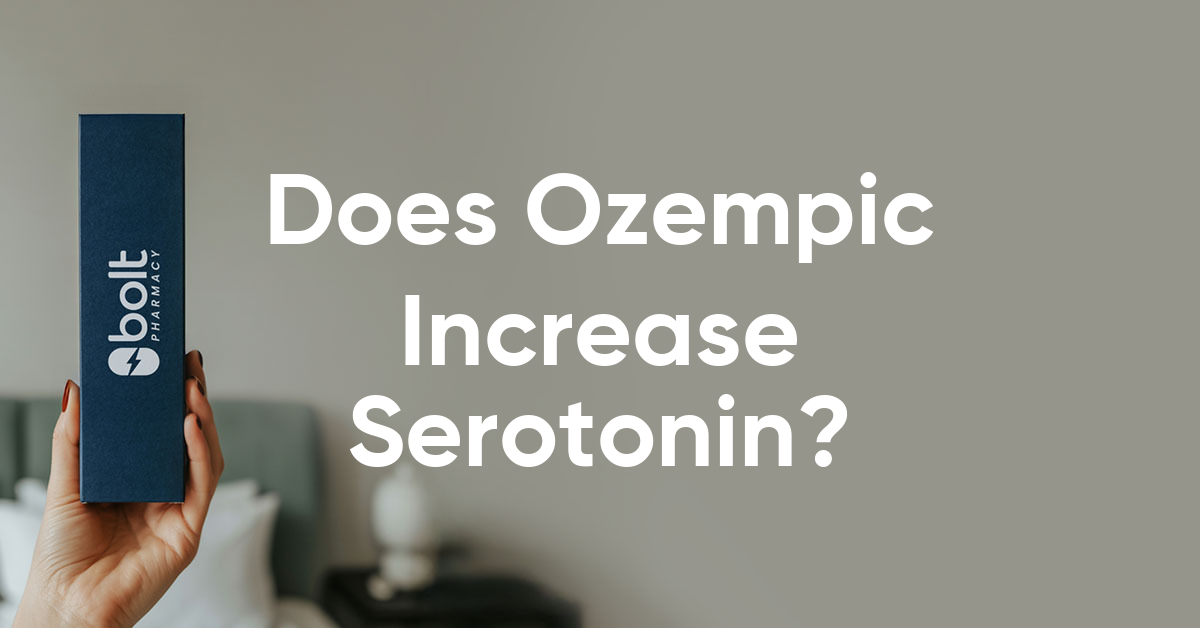Ozempic (semaglutide) is a GLP-1 receptor agonist licensed in the UK for type 2 diabetes management. Many patients wonder whether this medication affects brain chemistry, particularly serotonin levels, given its effects on appetite and mood. Understanding the distinction between Ozempic's established mechanisms—glucose regulation and appetite control—and its potential neurological effects is essential for informed treatment decisions. This article examines the evidence regarding Ozempic and serotonin, explores how GLP-1 medications interact with brain chemistry, and provides guidance on discussing these concerns with your GP.
Summary: Ozempic does not directly increase serotonin levels in the brain.
- Semaglutide is a GLP-1 receptor agonist that works through cyclic AMP signalling pathways, not serotonergic systems.
- The medication improves glycaemic control through glucose-dependent insulin secretion and glucagon suppression.
- GLP-1 receptors in the brain primarily regulate appetite and satiety rather than neurotransmitter production.
- No established pharmacological interaction exists between Ozempic and serotonergic medications like SSRIs.
- Patients experiencing mood changes whilst taking Ozempic should discuss these with their GP for comprehensive assessment.
- The MHRA continues to monitor reports of mental health effects in patients taking GLP-1 receptor agonists.
Table of Contents
Understanding Ozempic: How This Medication Works
Ozempic (semaglutide) is a glucagon-like peptide-1 (GLP-1) receptor agonist UK-licensed for the treatment of type 2 diabetes mellitus. According to its Summary of Product Characteristics (SmPC), it is indicated to improve glycaemic control in adults when diet and exercise alone prove insufficient, either as monotherapy when metformin is inappropriate or as an add-on therapy with other diabetes medications. Semaglutide is administered as a once-weekly subcutaneous injection, with a recommended titration schedule starting at 0.25mg for four weeks, then 0.5mg, with potential increase to 1mg if needed.
The primary mechanism of action involves mimicking the naturally occurring hormone GLP-1, which is released from the intestines following food intake. When semaglutide binds to GLP-1 receptors on pancreatic beta cells, it stimulates glucose-dependent insulin secretion. This means insulin is released only when blood glucose levels are elevated, thereby reducing the risk of hypoglycaemia compared to some other diabetes treatments. Additionally, Ozempic suppresses glucagon secretion from pancreatic alpha cells, further contributing to improved glucose regulation.
Beyond its effects on the pancreas, semaglutide acts on GLP-1 receptors in the brain, particularly in areas regulating appetite and satiety. This central nervous system activity leads to reduced appetite and delayed gastric emptying, which collectively contribute to weight loss—a beneficial effect for many individuals with type 2 diabetes. The medication has demonstrated significant efficacy in clinical trials, with patients achieving meaningful reductions in HbA1c levels and body weight. The SUSTAIN-6 trial also showed cardiovascular outcome benefits, which has influenced its positioning in NICE guideline NG28 for type 2 diabetes management.
Patients should be aware of important safety considerations, including the risk of pancreatitis (report severe persistent abdominal pain), gallbladder disease, potential worsening of diabetic retinopathy particularly with rapid HbA1c reduction, and increased hypoglycaemia risk when used with insulin or sulfonylureas.
It is important to recognise that whilst Ozempic affects various physiological systems, its primary therapeutic targets remain glucose metabolism and appetite regulation. Understanding these fundamental mechanisms provides essential context when considering any potential effects on neurotransmitter systems, including serotonin.

Does Ozempic Increase Serotonin Levels?
There is no official evidence that Ozempic directly increases serotonin levels in the human brain. According to the European Medicines Agency's European Public Assessment Report (EPAR) and the UK SmPC, semaglutide's pharmacological action centres on GLP-1 receptor activation, and these receptors belong to a different signalling pathway than those involved in serotonin synthesis, storage, or release. Serotonin (5-hydroxytryptamine or 5-HT) is a monoamine neurotransmitter produced primarily in the raphe nuclei of the brainstem and the enterochromaffin cells of the gastrointestinal tract, with its production and regulation governed by distinct enzymatic and receptor systems.
The GLP-1 receptor is a G-protein coupled receptor that, when activated, primarily influences cyclic AMP (cAMP) signalling pathways. This mechanism differs fundamentally from serotonergic pathways, which involve tryptophan hydroxylase enzymes for serotonin synthesis and specific serotonin transporters and receptors for its function. Current pharmacological literature does not identify semaglutide as having direct serotonergic properties, nor does it act as a serotonin reuptake inhibitor, releaser, or receptor agonist.
Whilst GLP-1 receptors are indeed present in various brain regions, including areas involved in mood regulation such as the hippocampus and hypothalamus, their activation by semaglutide does not translate to direct serotonin modulation. Any potential indirect effects on mood or emotional wellbeing would likely occur through alternative mechanisms, such as improvements in metabolic health, weight reduction, or changes in inflammatory markers associated with better diabetes control.
Patients should be aware that if they are taking medications that do affect serotonin—such as selective serotonin reuptake inhibitors (SSRIs) or other antidepressants—there is no established pharmacological interaction between these drugs and Ozempic regarding serotonin pathways. However, all medication combinations should be reviewed by a healthcare professional.
The Connection Between GLP-1 Medications and Brain Chemistry
GLP-1 receptors are widely distributed throughout the central nervous system, extending well beyond the hypothalamic regions traditionally associated with appetite control. Research has identified these receptors in the hippocampus, amygdala, prefrontal cortex, and brainstem—areas integral to memory, emotional processing, executive function, and autonomic regulation. This widespread distribution suggests that GLP-1 receptor agonists like Ozempic may influence various aspects of brain function beyond glucose homeostasis.
Emerging preclinical research has explored potential neuroprotective properties of GLP-1 receptor agonists. Animal studies have suggested that these medications may reduce neuroinflammation, promote neuronal survival, and potentially influence synaptic plasticity. Some experimental evidence indicates that GLP-1 receptor activation might modulate dopaminergic pathways involved in reward processing, which could theoretically affect eating behaviours and potentially mood-related circuits. However, it is crucial to emphasise that these findings derive predominantly from animal models and have not been conclusively demonstrated in human clinical practice.
The relationship between GLP-1 signalling and other neurotransmitter systems remains an active area of investigation. Whilst there may be complex interactions between metabolic signalling and classical neurotransmitter pathways, these connections are indirect and multifaceted rather than straightforward cause-and-effect relationships. For instance, improved metabolic health and weight loss achieved through GLP-1 receptor agonist therapy might secondarily influence neurotransmitter balance through reduced systemic inflammation or improved insulin sensitivity in the brain.
Patients should understand that whilst GLP-1 medications do act on the brain, their neurological effects are primarily related to appetite regulation and glucose sensing rather than direct neurotransmitter manipulation. The brain chemistry changes associated with these medications differ substantially from those produced by psychiatric medications designed specifically to alter neurotransmitter levels.
Ozempic's Effects on Mood and Mental Health
The relationship between Ozempic and mood remains a subject of ongoing clinical observation and research. Some patients report improvements in mood and wellbeing whilst taking semaglutide, though these effects are not universally experienced and may relate to multiple factors rather than direct pharmacological action on mood-regulating neurotransmitters. Weight loss, improved glycaemic control, and enhanced physical health can all contribute positively to psychological wellbeing, making it challenging to isolate specific mood effects attributable solely to the medication itself.
Clinical trial data for semaglutide have not identified mood elevation or depression as common adverse effects. The Summary of Product Characteristics (SmPC) for Ozempic, as published on the electronic medicines compendium (emc), does not list mood disturbances among the frequently reported side effects. The most common adverse reactions include gastrointestinal symptoms such as nausea, vomiting, diarrhoea, and constipation, which occur as expected consequences of delayed gastric emptying and are typically transient.
It is important to note that European and UK medicines regulators (EMA and MHRA) have reviewed reports of suicidal thoughts in patients taking GLP-1 receptor agonists. While no causal link has been established to date, monitoring continues. Patients experiencing significant mood changes or thoughts of self-harm whilst taking Ozempic should seek immediate medical attention. For urgent mental health support, contact NHS urgent mental health helplines, your GP, NHS 111, or go to A&E if in immediate danger. Any suspected adverse reactions should be reported through the MHRA Yellow Card scheme.
Patients should acknowledge that any chronic illness, including type 2 diabetes, carries an increased risk of depression and anxiety. The psychological burden of managing a long-term condition, concerns about complications, and the impact of symptoms on quality of life can all affect mental health. Conversely, achieving better disease control and experiencing positive physical changes may improve mood and self-esteem. These psychosocial factors can be more influential on mental wellbeing than any direct neurochemical effects of the medication.
Patients who experience mood changes whilst taking Ozempic—whether improvements or deterioration—should discuss these with their GP. Whilst there is no established link between semaglutide and serotonin-related mood disorders, any significant changes in mental health warrant clinical assessment. This is particularly important for individuals with pre-existing mental health conditions or those taking psychiatric medications, as comprehensive care requires consideration of all aspects of a patient's health.
What to Discuss With Your GP About Ozempic and Serotonin
When considering or currently taking Ozempic, several important topics warrant discussion with your GP, particularly if you have concerns about mood, mental health, or interactions with other medications. Firstly, provide a complete medication history, including any antidepressants, anxiolytics, or other psychiatric medications. Whilst there is no evidence of direct serotonin-related interactions between Ozempic and SSRIs or other serotonergic drugs, your GP needs a comprehensive picture to monitor your overall treatment safely.
If you have a history of depression, anxiety, or other mental health conditions, inform your GP before starting Ozempic. Whilst the medication does not directly affect serotonin levels, the physical side effects—particularly nausea and gastrointestinal disturbances—can sometimes impact wellbeing and quality of life. Your doctor can provide strategies to minimise these effects and monitor whether they affect your mental health. Additionally, discuss any previous experiences with weight changes and mood, as the weight loss associated with semaglutide might have psychological implications that vary between individuals.
Should you notice mood changes after starting Ozempic—whether positive or negative—report these to your GP promptly. Whilst such changes are unlikely to result from direct serotonin modulation, they may reflect the complex interplay between physical health improvements, lifestyle changes, and psychological factors. Your GP can assess whether these changes require any adjustment to your treatment plan or additional support.
It's important to understand the distinction between different semaglutide products. Ozempic is licensed only for type 2 diabetes management, while Wegovy (semaglutide 2.4mg) is specifically licensed for weight management under criteria specified in NICE Technology Appraisal 875, typically via specialist services. NHS England has advised against prescribing GLP-1 receptor agonists off-label for weight loss, particularly during supply constraints. Discuss with your GP the appropriate use of these medications based on your specific health needs.
Finally, ask about important safety monitoring: report severe persistent abdominal pain (potential pancreatitis), symptoms of gallbladder disease, visual changes if you have diabetic retinopathy, and signs of dehydration. If you're also taking insulin or sulfonylureas, discuss hypoglycaemia risk and monitoring. Women of childbearing potential should discuss contraception, as semaglutide should be discontinued at least two months before a planned pregnancy according to the SmPC. Remember that managing type 2 diabetes or obesity requires a holistic approach encompassing medication, lifestyle modification, and attention to mental as well as physical wellbeing.
Scientific References
Frequently Asked Questions
Can Ozempic interact with antidepressants that affect serotonin?
There is no established pharmacological interaction between Ozempic and serotonergic medications such as SSRIs, as semaglutide does not directly affect serotonin pathways. However, all medication combinations should be reviewed by your GP to ensure comprehensive monitoring of your overall treatment.
Why do some people report mood improvements on Ozempic?
Mood improvements may result from better glycaemic control, weight loss, improved physical health, and enhanced self-esteem rather than direct effects on serotonin or other mood-regulating neurotransmitters. These psychological benefits reflect the complex interplay between physical health improvements and mental wellbeing.
Should I report mood changes to my GP whilst taking Ozempic?
Yes, any significant mood changes—whether improvements or deterioration—should be discussed with your GP. Whilst Ozempic does not directly affect serotonin, comprehensive monitoring of mental health is important, particularly for patients with pre-existing mental health conditions or those experiencing thoughts of self-harm.
The health-related content published on this site is based on credible scientific sources and is periodically reviewed to ensure accuracy and relevance. Although we aim to reflect the most current medical knowledge, the material is meant for general education and awareness only.
The information on this site is not a substitute for professional medical advice. For any health concerns, please speak with a qualified medical professional. By using this information, you acknowledge responsibility for any decisions made and understand we are not liable for any consequences that may result.
Heading 1
Heading 2
Heading 3
Heading 4
Heading 5
Heading 6
Lorem ipsum dolor sit amet, consectetur adipiscing elit, sed do eiusmod tempor incididunt ut labore et dolore magna aliqua. Ut enim ad minim veniam, quis nostrud exercitation ullamco laboris nisi ut aliquip ex ea commodo consequat. Duis aute irure dolor in reprehenderit in voluptate velit esse cillum dolore eu fugiat nulla pariatur.
Block quote
Ordered list
- Item 1
- Item 2
- Item 3
Unordered list
- Item A
- Item B
- Item C
Bold text
Emphasis
Superscript
Subscript












